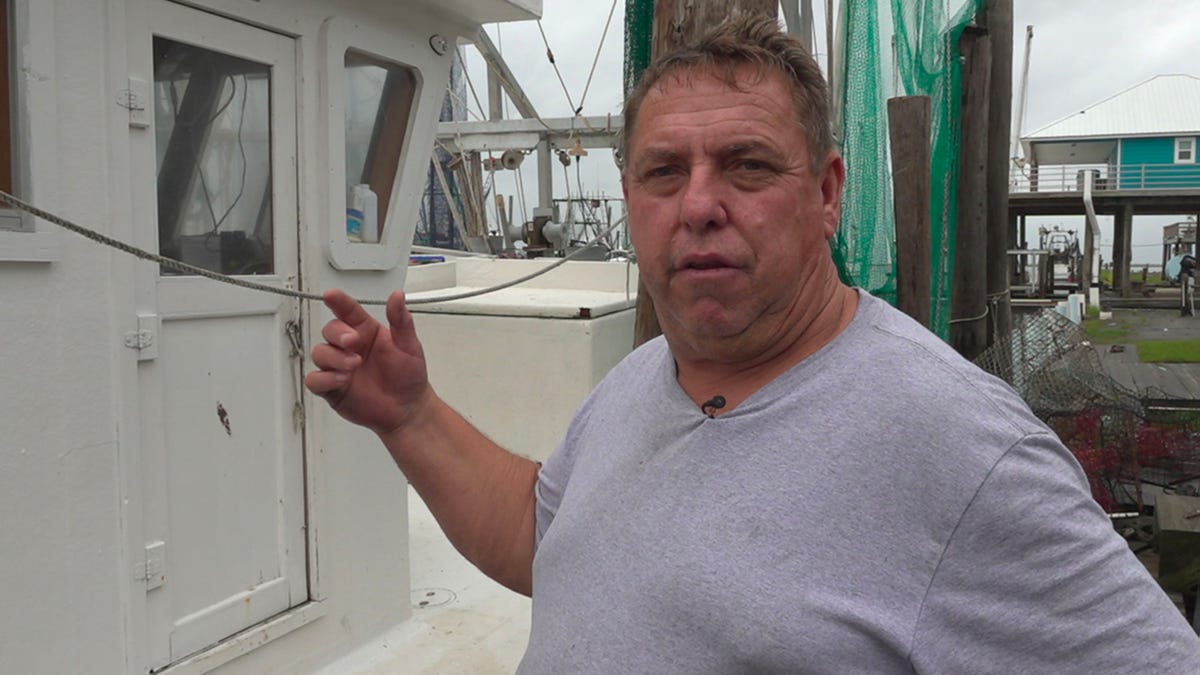Hurricane Barry rattles Gulf Coast fishermen already reeling from rough season
{{#rendered}} {{/rendered}}Gulf Coast commercial fishermen have taken another hit this season after Hurricane Barry struck Louisiana and Mississippi shores. Indeed, strong winds and rain from the Category 1 storm forced vessels to remain docked for days.
That was the case for Floyd Lesseigne of Grand Isle, La. The commercial fishermen, who has two boats that he takes out to harvest crabs, shrimp and oysters, said he and many others were forced out of the water early last week.
“You got about two days to prepare to pick up all of your equipment, your nets, your gas tanks,” Lesseigne explained. “It’s a pain in the rear.”
{{#rendered}} {{/rendered}}
Floyd Lesseigne stands by his docked boat in Grand Isle, La. He estimates he left as much as $1,500 in profit at sea because Hurricane Barry put his business out of commission for several days. (Fox News/ Charles Watson)
He and his wife fared OK when Barry finally made landfall. Apart from scattered debris and toppled items, there wasn’t much damage to his 14-foot elevated home, where ring lines told the story of the eight inches of floodwater that had surrounded it earlier in the day.
Most of Lesseigne’s damage was actually monetary; his boats sat docked and dozens of empty crab traps piled up on the side of his property. He estimated that he had lost as much as $1,500 in the five days that he had been unable to fish.
BARRY THREATENS LOUISIANA, ARKANSAS, DOWNGRADED TO TROPICAL DEPRESSION
{{#rendered}} {{/rendered}}“If you not out there catching them, and you at the house playing with a storm and losing them five days of shrimping, them shrimp are gone,” he said. “You can’t make that up.”
Fishermen up and down the coast between have already had a tough go of it this season. Parts of the Gulf Coast have been inundated with freshwater the Army Corps of Engineers has been diverting from the Mississippi River, which has swelled for months with water draining from further north. The great quantities of freshwater have forced marine life further out into the Gulf in search of water with more salinity.
There’s also been a rise in toxic algae blooms along the coastline. Recently, more than two dozen beaches in Mississippi, Louisiana and Texas were either closed or placed under advisory. The issues have forced many commercial fishermen to travel out further into the Gulf to find a good catch.
{{#rendered}} {{/rendered}}VOLUNTEERS RUSH TO TRANSPORT SHELTER ANIMALS THREATENED BY BARRY OUT OF STORM'S PATH
Lt. Brian Waters of Coast Guard Grand Isle Station said he expected to see commercial fishing vessels back out on the water no more than 48 hours after the storm's passage.
Several commercial fishing vessels docked in Grand Isle, La. Heavy rain and wind from Hurricane Barry forced commercial fishermen out of the game for days. (Fox News/ Charles Watson)
“They do this day in and day out,” Lieutenant Waters said. “They’re going to want to get out as soon as they possibly can and as safely as they can.”
{{#rendered}} {{/rendered}}But Lesseigne, without power after Barry, had nowhere to store his catch if he did venture out. And there was no one to sell it to, with his buyer in the dark.
“He’s got to have power to weigh this stuff up,” Lesseigne said.
The fourth-generation fisherman was hopeful that he would be able to get back out on the water the next day, because time is of the essence.
{{#rendered}} {{/rendered}}CLICK HERE TO GET THE FOX NEWS APP
“This is a seasonal business,” Lesseigne said. “You got to make it when it’s there.

